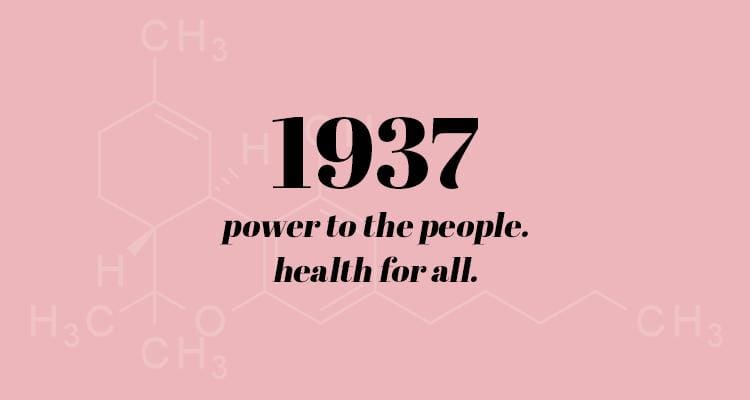Botanicals for Health and Wellness

In the last few years, the wellness industry has exploded. You can find a supplement for just about everything, and the claims these products make sound awesome! You can find products claiming to elevate your mood, lessen anxiety, give you more energy, even clear up your skin. But are they too good to be true? How do you know what ingredients will actually help?
The only way to be sure is to understand the different botanicals that can influence your health and wellness. One of our biggest missions at 1937 Hemp Store is to promote hemp education. That way, people understand how they benefit from hemp products and they know how to find high-quality products. But we’re not stopping there!
It just makes sense to turn to mother nature when we’re feeling off-balance. This week we’re giving you an overview of the different types of plants that can bring more balance to your health and wellness.
What Are Botanicals?
When you think of “botanicals,” what comes to mind? If you’re imagining different plants and flowers, you’re on the right track.
It basically means, “relating to plants or botany” or “a substance obtained from a plant.” Often it referred to plants used for medicinal purposes, or even just plants used as flavoring agents for aromatic liquors.
Today, however, it encompasses an entire world of herbs, flowers, and roots used in beauty and wellness products. Even more than that though, people are starting to use botanicals in much the same way they use over-the-counter medicines.
Although plants and minerals were the original pharmaceuticals, botanical medicines can legally only be classified as dietary supplements. Even with this classification, there’s still plenty of clinical evidence for the effectiveness of many different botanicals for a variety of ailments. For example, many women use black cohosh supplements to relieve menopause symptoms.
It doesn’t seem too far-fetched to imagine that different plants and minerals could help balance hormones, gastrointestinal issues, or even help you sleep better. But what about botanicals that supposedly ease anxiety or boost your mood?
You may be surprised to find out that many of those claims are 100% correct. It all comes down to the mind and body connection.
Botanicals for Mind and Body Wellness
In the very recent past, phrases like “it’s all in your head” or “just get over it” were pretty common. Now we’re learning that our mental and physical states are innately connected.
Ever gone through emotional trauma and then had a hard time shaking a cold? Or maybe it happened the other way around. Maybe you were injured and then experienced anxiety or depression. The experiences we go through, whether emotional or physical, have a huge impact on our overall health and wellness. We even have specific systems in place that help our brains connect our physical and mental experiences.
One such example would be the Limbic System. This includes the hippocampus (which helps with memory, learning, spatial reasoning, and long-term information) and the amygdala (which helps our bodies process emotions). Basically, this system is the bridge that connects our psychological and physiological experience.
For example, think of the last time you were frightened. Did your heart rate increase? Did you breathe faster? Maybe you even started sweating. The whole point is that your limbic system understood your emotions and released certain hormones, like adrenaline and cortisol, to prepare you for a fight-or-flight response.
To read more about Mind & Body Medicine, click here!
That’s just one example of how your mind and body work together to create the human experience. If you’ve been part of the 1937 Hemp Store family for a while, you already know that the Endocannabinoid System helps regulate many physiological processes, including stress responses. That’s the whole reason why hemp and CBD products are able to help people with both physical and emotional issues.
So the idea that plants can have an impact on your mindset is entirely plausible!
What Are Some Different Types of Botanicals?
In the past, people were only able to access plants that grew locally. Today, however, you can access herbs, roots, and even mushrooms from every exotic corner of the world.
To give you a small idea of the many different botanicals you may run across, here are several herbs, flowers, roots, mushrooms, and algae that can give your health and wellness a boost.
Botanical Herbs, Flowers, and Trees
You’re probably familiar with some of these. In fact, you’ve probably got a few of these in your spice cabinet right now! The list of botanical herbs is vast, but here are a few classics you should be aware of.
Skullcap
While it’s technically in the mint family, skullcap is an herb traditionally used for its leaves which have sedative properties. This makes it useful for combating anxiety or insomnia.
Wheat Grass
It may not sound appetizing, the freshly sprouted leaves of the wheat plant are high in Vitamins A, C, and E as well as amino acids, iron, and a few other important minerals.
Peppermint
The classic peppermint plant has been used for centuries not only as a flavoring agent, but also to relieve digestive problems, nausea, and to calm the mind.
Fennel
This perennial, pleasant-smelling herb has several medicinal uses. Its seeds are useful for heartburn, bloating, loss of appetite, and it’s been known to ease menopause symptoms.
Black Pepper
Yes, the black pepper you have in your cabinet is actually VERY good for you. Not only is it an antioxidant, but it can also improve how well your body absorbs other vitamins and minerals. Plus, it has high levels of beta-caryophyllene, a terpene with powerful analgesic properties.
Gingko Leaf
Also known as Gingko Biloba, this is actually a tree with powerful medicinal properties. It can reduce inflammation, improve heart health and circulation, and can even slow down the onset of dementia.
Chamomile
Whether you’re using chamomile oil or drinking chamomile tea, this flower is particularly calming, can reduce stomach issues, and has pain-relieving properties.
Dandelion
Yes, the bright yellow weed you keep trying to eradicate from your yard actually has incredible detoxification properties. On top of that, it’s also an anti-inflammatory, may lower blood pressure, and has lots of antioxidants.
Rosehip
You may be familiar with rosehip tea, but pretty soon you’ll be seeing this plant in skincare products all over the place. That’s because it has lots of polyphenols which make it great at fighting free radicals. On top of fighting skin aging, it’s also an anti-inflammatory and may support a healthy immune system.
Botanical Roots
There are several different plants used specifically for their roots. You’re probably familiar with ones like Licorice and Ginger, but what about Rhodiola? Ashwagandha? Ok, let’s dig in!
Valerian
The root of this plant has been called “nature’s Valium” because of its relaxing, sedative qualities. Due to its high levels of antioxidants like hesperidin and linarin, it’s very good at helping people get restful sleep. It’s also been known to help with PMS, restless leg syndrome, and anxiety.
Licorice
You may only be familiar with the licorice flavor of certain candies and beverages, but this root packs a powerful punch of holistic benefits. Licorice root has been used for centuries to soothe gastrointestinal issues, ease respiratory problems, and even reduce stress.
Ginger
A favorite spice for holiday treats, ginger root also has several medicinal properties that everyone can benefit from. It’s a powerful treatment for nausea, may lower blood sugar, reduce the risk of heart disease, and may even improve brain function.
Turmeric
This vividly orange substance is one of the most nutritionally dense supplements available. Turmeric contains a substance called curcumin, a powerful antioxidant and anti-inflammatory. This is what gives turmeric its brain-boosting and joint-soothing properties.
Pro-Tip: When supplementing with turmeric, boost your black pepper consumption to help your body absorb more curcumin.
Ashwagandha
This ancient medicinal adaptogen helps your body maintain balance and respond to stress. A mainstay in Ayurvedic practices, the root of this plant has been used for centuries to relieve stress, boost energy and focus, and reduce inflammation.
Rhodiola
The root of this herb has been used in Russian and Scandinavian cultures for centuries for its ability to reduce stress, alleviate fatigue, and even improve brain function.
Botanical Algae
While you might think algae is just the stuff that scums up your pools and aquariums, certain types of algae are actually rich in vitamins and minerals. Here are two of our favorites!
Spirulina
Often referred to as “blue-green algae,” spirulina is insanely nutritious. One tablespoon has four grams of protein, 11% of your RDA (recommended dietary allowance) of Vitamin B1, 15% of your RDA for Vitamin B2, 4% of your RDA of Vitamin B3, 21% of the RDA for copper, and 11% of the RDA for Iron. It has even more nutrients than that, making this one of the most nutrient-dense supplements available.
Chlorella
This freshwater algae is a complete protein source all on its own. It contains most of the same nutrients that spirulina does, but it also a good dose of Omega-3s, can aid in detoxification by binding to heavy metals, and can give your immune system a much-needed boost.
Botanical Mushrooms
If you’re one of those people that can’t stand the taste of mushrooms, then rest easy. Most of these nutritionally dense mushrooms can be purchased as powders and easily added to smoothies, lattes, or other food items. Plus, once you find out how healthy they are, you might start singing a different tune.
Wild Chaga
They may be kind of ugly to look at, but these mushrooms have been a big part of holistic medicine in Siberia and other parts of Asia for a long time. It’s a powerful anti-inflammatory, may strengthen your immune system, and may even lower cholesterol and blood sugar.
Lions Mane
These large, shaggy looking mushrooms are gaining popularity in the Western world for their powerful brain and mood-boosting properties. Not only may they protect against dementia, but they can also soothe anxiety and depression, aid in the recovery of nervous system injuries, and even protect against ulcers.
Cordyceps
While it’s pretty tricky to harvest these fungi, they’re well worth the effort. They’re thought to improve oxygenation during exercise, improve heart health, and they have powerful anti-aging properties.
Reishi
This mushroom grows in several hot, humid locations around Asia. Much of its medicinal value is attributed to the triterpenoids, polysaccharides, and peptidoglycans it contains. Regardless of how it does it, reishi may boost your immune system, alleviate fatigue, ease depression, and it may even boost your good cholesterol.
Start Using Mother Nature's Medicine Cabinet!
The above list is by no means comprehensive, but we wanted to introduce you to some of the different botanicals you may run across. Plus, if you’re looking for more detailed information, we’ve got your back! We’re going to start diving into some of the more common botanicals so you can stay educated and informed about what goes into your body.
We do want to remind everyone to discuss any new supplements with their healthcare provider. While these plants have been used for centuries for their health and wellness benefits, you could have a unique sensitivity or you may be on prescription medications that shouldn’t be mixed with some of these supplements. Safety first!
Let us know in the comments if you’ve got a favorite botanical, and be sure to check out some of our products that are already taking advantage of mother nature’s medicine cabinet.

Hannah Walker is a mostly-retired University English instructor who spends her time freelance copywriting. When not doing that, she’s writing articles related to CBD, skincare, and/or media. With an MA in English-Creative Writing she’s probably working on a creative piece at this very moment. See more about Hannah’s work on her website or on Instagram.




